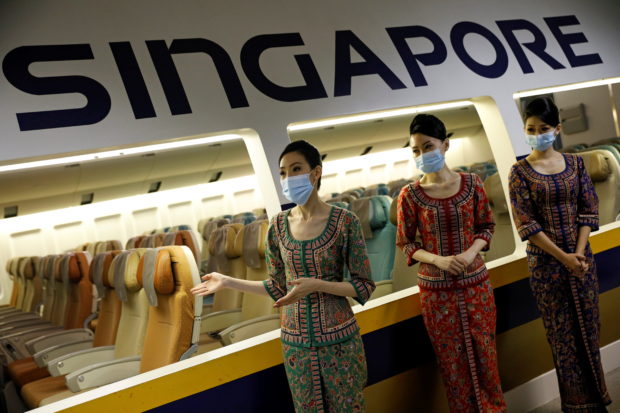Singapore, Vietnam looking at easing COVID-19 travel curbs for business, leisure

Cabin crew speak to participants during a tour of the Singapore Airlines Training Centre in Singapore November 21, 2020, as part of a series of initiatives to re-engage customers who have not been able to travel due to the coronavirus. REUTERS FILE PHOTO
SINGAPORE — Singapore and Vietnam are looking at gradually relaxing travel curbs for business and trips to selected tourist sites in the next few months, Foreign Minister Vivian Balakrishnan said on Wednesday (June 23).
However, such plans will depend on how fast Vietnam can vaccinate its population.
He was speaking at a doorstop via Zoom at the conclusion of a four-day visit to Vietnam capital Hanoi, where he met newly-appointed President Nguyen Xuan Phuc, Prime Minister Pham Minh Chính and Deputy Prime Minister Pham Binh Minh.
Dr Balakrishnan said the two nations share a similar strategy to contain the pandemic such as the need for intensive testing, quarantines and mass inoculation.
Vietnam has also imposed strict measures such as shutting non-essential businesses and restricting gatherings even before it began to battle its worst outbreak.
Article continues after this advertisementThat started in late April from a church cluster in Ho Chi Minh City and factories in the country’s North.
Article continues after this advertisementOnly about 2 per cent of its 98 million population are vaccinated.
“We have also discussed in the next few months, hopefully by the end of the year, how we can gradually and safely liberalize particularly on business travel, and perhaps on selected tourist sites.”
“But the key thing first is Vietnam needs some time to step up its vaccination program – so we will wait for them to be ready.”
In the meantime, Dr Balakrishnan said both countries are engaged at the staff level to work on a mutual recognition of vaccine certificates and testing results to build confidence towards border reopening.
In new rules announced on Wednesday, travelers from Vietnam are subject to a 14-day quarantine in Singapore at dedicated facilities beginning on June 28, with a mandatory antigen rapid test on the third, seventh and eleventh day after arrival. Previously, they would have to undergo a 21-day stay-home notice.
Vietnam has suspended the entry of all foreigners except diplomats, investors, experts and skilled workers.
Dr Balakrishnan said Vietnam has also expressed interest in Singapore technology like breathalyzer test kits, adding that the Republic will help source and evaluate.
On the Myanmar crisis, he said both governments reiterated calls for violence to cease and for dialogue to begin. “Vietnam and Singapore stand ready to do what we can without interfering.”
Asean leaders in April agreed on a five-point consensus at a special summit in Jakarta, calling for Myanmar to stop violence and start dialogue with its opponents in a process that will be facilitated by a special Asean envoy, aided by the Asean secretary-general.
Dr Balakrishnan has acknowledged the slow progress so far, saying at a Special Asean-China Foreign Ministers’ Meeting earlier this month that there had been “no real sign of meaningful political dialogue and negotiation”.
The conflict, which started after the army seized power on Feb 1 and removed Ms Aung San Suu Kyi’s elected government, has left at least 870 people dead, according to the Assistance Association for Political Prisoners activist group.
Dr Balakrishnan said Singapore and Vietnam share the same position that Asean centrality and unity must be maintained and that “it is even more important for Asean rules to be accentuated (in view of) the regional developments, global developments, superpower rivalry”.
For more news about the novel coronavirus click here.
What you need to know about Coronavirus.
For more information on COVID-19, call the DOH Hotline: (02) 86517800 local 1149/1150.
The Inquirer Foundation supports our healthcare frontliners and is still accepting cash donations to be deposited at Banco de Oro (BDO) current account #007960018860 or donate through PayMaya using this link.